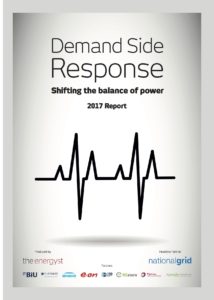Removal of Triad export payments has torpedoed demand-side response (DSR) business cases, at least in the short term, according to the flexibility lead at one of the UK’s largest FM companies.
Lee Stokes, head of demand management at Mitie, told The Energyst’s DSR Event that “nothing can replace Triad” in terms of bankable revenue for demand-side response providers.

While National Grid and event sponsors including Enernoc, Engie, Eon, Restore and UK Power Reserve urged businesses to be “flexible with flexible megawatts” to unlock maximum value as markets and products fluctuate, Stokes was blunt.
“It doesn’t matter how you stack products, or how you manage your flexibility. In the short-term, nobody is going to recover completely from that [Triad] hit,” he said.
“If you have already put your business case in, and pegged Triads with National Grid’s five-year forecast, the revenue will not [now] stack up, that is clear.”
Speaking on the same panel, Welsh Water expressed disappointment that its investment in renewable hydro assets, now totalling some 15.7MW, had been hit by the same blunt instrument.

That hydro investment was “massive”, according to Welsh Water senior energy innovation analyst, Andrew Heygate-Brown, but returns are now “heavily” undermined by “something designed, we believe, to deal with the diesel farms issue”.
Despite that, Heygate-Brown said Welsh Water remained committed to reducing customer bills through demand-side response and aimed to invest in readying assets for higher value frequency response services. Unlocking those assets, the firm believes, will also enable them to play in other flexibility markets, both existing and emerging.
Despite the Triad issue, Mitie’s Stokes – who implemented one of Europe’s largest DSR projects at his previous employer, BT – agreed that DSR remains commercially viable for businesses that integrate procurement, management and flexibility.
“Buy your commodity, energy, as cheaply as you can; avoid as much as you can on your non-commodity costs; and use as little as you can,” said Stokes.
“That has got to be your strategy.”
 Andrew Heygate-Brown and Lee Stokes are among many end user and industry experts interviewed for The Energyst’s 2017 DSR report, available here as a free download.
Andrew Heygate-Brown and Lee Stokes are among many end user and industry experts interviewed for The Energyst’s 2017 DSR report, available here as a free download.
Related stories:
Free 2017 DSR report: Shifting the balance of power
Battery storage to slash frequency response revenues by 75%?
Strong SME appetite for DSR but sector ignored by aggregators
20 firms outline what it stopping them providing DSR
Battery storage: Finance a challenge but businesses predict 3-7 year paybacks
Energy storage ‘will wipe out’ battery storage
UK Power Networks outlines smart grid plans
Can National Grid hit its 2020 DSR target?
National Grid adds 500MW of flexibility in 2016, more to come
Eon: Avoid DSR sticking plasters and long-term contracts
WPD launches DSR aggregator business
As solar subsidies wane, investors plan 2.3GW of battery storage projects
Free report: DSR and battery storage
Follow us at @EnergystMedia. For regular bulletins, sign up for the free newsletter.



